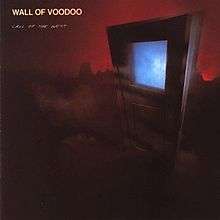Call of the West
- This article is for the music album. For the television series whose repeats were broadcast as "Call of the West", see Death Valley Days.
| Call of the West | ||||
|---|---|---|---|---|
 | ||||
| Studio album by Wall of Voodoo | ||||
| Released | 1982 | |||
| Recorded | July 1982 | |||
| Genre | Darkwave, post-punk | |||
| Length | 40:48 | |||
| Label |
I.R.S. (USA) Illegal (UK) | |||
| Producer | Richard Mazda | |||
| Wall of Voodoo chronology | ||||
| ||||
| Professional ratings | |
|---|---|
| Review scores | |
| Source | Rating |
| Allmusic | |
| Robert Christgau | B[1] |
| Rolling Stone | (not rated) link |
Call of the West is the second studio album by Los Angeles new wave band Wall of Voodoo, released in 1982. "Mexican Radio", released as a single and as a video that received moderate airplay on MTV, is the group's most well-known song.
Australian label Raven Records reissued a digitally remastered CD of Call of the West. It is coupled with the first Wall of Voodoo album, the long out of print Dark Continent.
Track listing
- "Tomorrow" – 3:03
- "Lost Weekend" – 4:59
- "Factory" – 5:33
- "Look at Their Way" – 3:18
- "Hands of Love" – 3:54
- "Mexican Radio" – 4:11
- "Spy World" – 2:41
- "They Don't Want Me" – 4:31
- "On Interstate 15" – 2:44
- "Call of the West" – 5:59
- All music composed by Wall of Voodoo.
- All lyrics composed by Stan Ridgway.
- Note: The original cassette release of the album features a bonus track called "Exercise" at the end of side one, following "Hands of Love".
Personnel
- Stan Ridgway – lead vocals, harmonica, keyboards
- Marc Moreland – 6- and 12-string guitars
- Joe Nanini – drums, percussion, spoken word
- Chas T. Gray – synthesizer, bass guitar, melodica, backing vocals
with:
- Richard Mazda – bass guitar
- Louis Rivera – percussion
Charts
Album
| Year | Chart | Position |
|---|---|---|
| 1983 | Billboard Pop Albums | 45 |
Singles
| Year | Chart | Single | Position |
|---|---|---|---|
| 1983 | Billboard Mainstream Rock | "Mexican Radio" | 41 |
| Billboard Pop Singles | 58 |
References
- ↑ Christgau, Robert. "Wall of Voodoo". Robert Christgau.
External links
This article is issued from
Wikipedia.
The text is licensed under Creative Commons - Attribution - Sharealike.
Additional terms may apply for the media files.